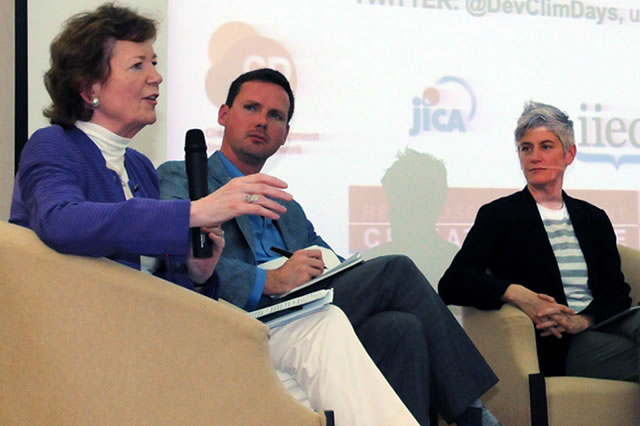On Sunday 02 December, Mary Robinson took part in a session on ‘Fast-paced reflections’ as part of the Development and Climate Days organised by the Red Cross/Red Crescent Climate Centre, the International Institute for Environment and Development (IIED)
On Sunday 02 December, Mary Robinson took part in a session on ‘Fast-paced reflections’ as part of the Development and Climate Days organised by the Red Cross/Red Crescent Climate Centre, the International Institute for Environment and Development (IIED) and the Climate and Development Network (CDKN).
Now in its 10th year, the theme of this year’s Development and Climate Days was ‘Innovative approaches, incisive dialogue on climate-smart development’ with a focus on learning-by-doing, featuring innovative dialogues between negotiators and policy makers, knowledge centres and practitioners.
In her reflections, Mary Robinson said that she wanted to put climate change on the political agenda and build constituencies of demand – involving grassroots organisations, vulnerable communities, young people, small businesses, local governments and civil society – that would demand urgent and ambitious action.
She urged those present to work with her for a movement centered on a climate justice narrative and to demand more of their political leaders so that by COP21 in 2015 it will have become unacceptable for ministers to return home with a weak outcome.
Ms. Robinson was also a panellist in the closing session of the World Climate Summit (WCS), an international business and finance conference which ran all day on 2nd December.
The panel, chaired by WCS founder, Mr Michael Mathres was completed by EU Commissioner on Climate Action, Ms. Connie Hedegaard and IPCC Vice-Chair, Professor Jean-Paschal van Ypersele. Ms. Robinson told the business community that it must work not only have to find solutions to the problems posed by climate change but to inject long-term thinking into the political discourse on climate change.
Commissioner Hedegaard argued that in order to create a resource-efficient world, we needed to start by phasing out fossil fuel subsidies while Professor van Ypersele gave a stark warning to those assembled:
‘There will be no business when there’s a climate crisis’.
Using access to sustainable energy to highlight the potential for increased business involvement, Ms. Robinson said that a new type of public private partnership was possible: one where the private sector, who hold the technology and know-how, work with governments to deliver access to energy to the poorest through social protection.
Related:
Focus Area: Access to Sustainable Energy
Robinson calls on US to act on climate change – The Irish Times
03 December 2012
Speaking at the final session of a business-orientated World Climate Summit in Doha, Qatar, Mary Robinson said that the US “must now increase its ambition” in tackling climate change and US president Barack Obama “needs to give that leadership”.
A focus on children and young people on Day 4 of COP18
30 November 2012
At the Intergenerational Inquiry organised by YOUNGO, the official youth constituency at the UNFCCC, Troika+ members Ms. Christiana Figueres, Ambassador Dessima Williams and Mary Robinson discussed the role and importance of youth in the UNFCCC process. During the inquiry, youth representatives were invited to pose questions to the panel and the panellists in turn posed questions back to the audience.
MRFCJ’s Head of Research & Development in Outreach Magazine’s ‘Quote of the Day’
28 November 2012
On Monday at COP18/CMP8, Dr Tara Shine, Head of Research and Development at MRFCJ, and Edward Cameron, Director, International Climate Initiative at the World Resources Institute, were selected as the ‘Quote of the Day’ by Outreach Magazine.


